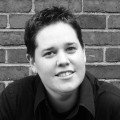Braddock Avenue Books: Your book Teaching Queer: Radical Possibilities for Writing and Knowing came out this year. Was there a particular moment or set of moments that inspired you to write about queerness as pedagogy as opposed to your traditional platform of poetry?
Stacey Waite: My first love, even before poetry, was teaching. I knew from a young age that I wanted to be a teacher. My mother and step-father are two of the most dedicated teachers I have ever known. And the connections between teaching and writing have always felt inevitable to me. So the new book, while I guess it's a book of scholarship, also at times feels like a poem, or many poems.
BAB: What are the advantages of regarding the practices of writing and teaching as queer? Are there any disadvantages?
Waite: I don't tend to think of things as having advantages and disadvantages or pros and cons, etc. I tend to think that looking at one thing through the lens of another is a valuable critical activity. And that just happens to be what metaphor is--looking at one thing in terms of another. To me, this is the only way to learn about the very thing we are looking at. So if we are looking at teaching and writing through the lens of queerness, or if we look at queerness through the lens of teaching, there is so much to learn, so much to ask, so much to confound and amaze us.
BAB: Teaching Queer analyzes transcripts of classroom discussions and student writing samples to explore queerness. How do you believe your book fits outside of the traditional classroom? What conversations can it inform apart from the academic setting?
Waite: I think (and I hope) the book offers a way of looking at reading and writing—something most of us (except apparently our president) do quite frequently. So in that sense it's relevant. I also think the book is aimed as both an act of scholarship and as an act of art. It's not a conventional book in that sense. One can learn just as much about loons, martial arts, and my own life as they can about teaching and writing. So in that sense, I hope it speaks to anyone.
BAB: Your poetry, such as that in Butch Geography, explores queerness as an identity. How does identity fit into Teaching Queer? How can writing speak, or speak back to identity?
Waite: The first chapter "Becoming the Loon" is all about being a queer teacher, and the book itself never separates my own queerness from the pedagogy I enact and describe.

